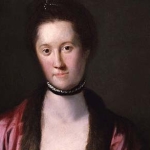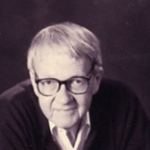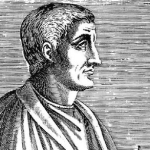I whole in body, and in mind,
but very weak in purse,
Do make, and write my testament
for fear it will be worse.
And first I wholly do commend
my soul and body eke,
so long as I can speak.
And after speech, my soul to him,
and body to the grave,
Till time that all shall rise again,
their Judgement for to have,
And then I hope they both shall meet,
to dwell for aye in joy;
Whereas I trust to see my friends
released from all annoy.
Thus have you heard touching my soul,
and body what I mean:
I trust you all will witness bear,
I have a steadfast brain.
O God, now let me dispose such things,
as I shall leave behind,
That those which shall receive the same,
may know my willing mind.
I first of all to London leave,
because I there was bred,
Brave buildings rare, of churches store,
and Paul’s to the head.
Between the same, fair treats there be,
and people goodly store;
Because their keeping craveth cost,
I yet will leave him more.
First for their food, I butchers leave,
that every day shall kill;
By Thames you shall have brewers’ store,
and bakers at your will.
And such as orders do observe,
and eat fish thrice a week,
I leave two streets, full fraught therewith,
they need not far to seek.
Watling Street, and Canwick Street,
I full of woolen leave;
And linen store in Friday Street,
if they me not deceive.
And those which are of calling such,
that costlier they require,
I mercers leave, with silk so rich,
as any would desire.
In Cheap of them, they store shall find,
and likewise in that street,
I goldsmiths leave, with jewels such,
as are for ladies meet.
* * *
Now when the folk are fed and clad
with such as I have named,
For dainty mouths, and stomachs weak
some junckets must be framed.
Wherefore I potecaries leave,
with banquets in their shop,
Physicians also for the sick,
Diseases for to stop.
Some roysters still must bide in thee,
and such as cut it out;
That with the guiltless quarrel will,
to let their blood about.
For them I cunning surgeons leave,
some plasters to apply,
That ruffians may not still be hanged,
nor quiet persons die.
* * *
To all the bookbinders by Paul’s,
because I like their art,
They every week shall money have,
when they from books depart.
Among them all, my printer must
have somewhat to his share;
I will my friends these books to buy
of him, with other ware.
For maidens poor, I widowers rich
do leave, that oft shall dote:
And by that means shall marry them,
to set the girls afloat.
And wealthy widows will I leave
to help young gentlemen;
Which when you have, in any case,
be courteous to them then:
And see their plate and jewels eke
may not be marred with rust;
Nor let their bags too long be full,
for fear that they do burst.
* * *
And Bedlam must not be forgot,
for that was oft my walk:
I people there too many leave,
that out of tune do talk.
* * *
At th’ Inns of Court, I lawyers leave
to take their case in hand.
And also leave I at each Inn
of Court, or Chancery,
Of gentlemen, a youthful roote,
full of activity,
For whom I store of books have left,
at each bookbinder’s stall:
And part of all that London hath,
to furnish them withal.
And when they are with study cloyed,
to recreate their mind,
Of tennis courts, of dancing schools,
and fence they store shall find.
And every Sunday at the least,
I leave to make them sport,
In divers places players, that
of wonders shall report.
Now, London, have I (for thy sake)
within thee, and without,
As comes into my memory,
dispersèd ’round about
Such needful things as they should have,
here left now unto thee;
When I am gone, with conscience,
let them dispersèd be.
And though I nothing namèd have,
to bury me withal,
Consider that above the ground,
annoyance be I shall.
And let me have a shrouding sheet
to cover me from shame,
And in oblivion bury me,
and never more me name.
Ringings nor other ceremonies
use you not for cost,
Nor at my burial, make no feast,
your money were but lost.
* * *
This XX of October, I,
in ANNO DOMINI,
A thousand, v. hundred seventy-three,
as almanacs descry,
Did write this will with mine own hand,
and it to London gave;
In witness of the standers-by,
whose names, if you will have,
paper, pen and standish were,
at that same present by,
With Time, who promised to reveal
so fast as she could buy
The same, lest of my nearer kin
for any thing should vary;
So finally I make an end
no longer can I tarry.

















Comment form: